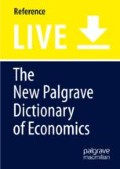Abstract
In any theory of income distribution in which one type of return is determined residually, it will be tautologically true that the various different incomes, as determined by the theory, will add up so as to exhaust the total product. By contrast, any theory which provides a ‘positive’ explanation for every category or return, treating none as a residual, must show that the various returns so explained do indeed exhaust the product. In practice, it has been with reference to the marginal productivity theory that this consistency requirement has received considerable attention. By the early 1890s a number of authors had sought to extend the ‘principle of rent’ into a completely general theory of distribution but it was P.H. Wicksteed, in his Co-ordination of the Laws of Distribution (1894) who first clearly stated, and attempted to resolve, the resulting adding-up problem.
This chapter was originally published in The New Palgrave: A Dictionary of Economics, 1st edition, 1987. Edited by John Eatwell, Murray Milgate and Peter Newman
References
Edgeworth, F.Y. 1904. The theory of distribution. Quarterly Journal of Economics. Reprinted in F.Y. Edgeworth, Papers relating to political economy, vol. I. London: Macmillan, 1925.
Flux, A.W. 1894. Review of Wicksell’s Über Wert, Kapital und Rente and of Wicksteed’s co-ordination, etc. Economic Journal 4: 305–313.
Hicks, J.R. 1968. The theory of wages, 2nd ed. London: Macmillan.
Hutchison, T.W. 1953. A review of economic doctrines, 1870–1929. Oxford: Clarendon Press. ch. 5.
Robbins, L. 1933. Editorial introduction to P.H. Wicksteed. The common sense of political economy. London: Routledge & Kegan Paul.
Robinson, J.V. 1934. Euler’s theorem and the problem of distribution, Economic Journal. Reprinted in Collected economic papers of Joan Robinson, vol. I. Oxford: Blackwell, 1966.
Samuelson, P.A. 1983. Foundations of economic analysis, enlargedth ed. Cambridge, MA: Harvard University Press. ch. 4.
Stigler, G.J. 1968. Production and distribution theories: The formative period. New York: Agathon Press. ch. 12.
Walras, L. 1874–7. Elements of pure economics. London: Allen & Unwin, 1954 (Appendix III).
Wicksell, K. 1934. Lectures on political economy, vol. I. London: Routledge & Kegan Paul. esp. pp. 101, 125–33.
Wicksteed, P.H. 1894. An essay on the co-ordination of the laws of distribution. London: Macmillan. Subsequent editions, ed. L. Robbins, LSE Reprints, 1932; ed. I. Steedman. London: Duckworth, 1987.
Author information
Authors and Affiliations
Editor information
Editors and Affiliations
Copyright information
© 1987 The Author(s)
About this entry
Cite this entry
Steedman, I. (1987). Adding-Up Problem. In: Durlauf, S., Blume, L. (eds) The New Palgrave Dictionary of Economics. Palgrave Macmillan, London. https://doi.org/10.1057/978-1-349-95121-5_507-1
Download citation
DOI: https://doi.org/10.1057/978-1-349-95121-5_507-1
Received:
Accepted:
Published:
Publisher Name: Palgrave Macmillan, London
Online ISBN: 978-1-349-95121-5
eBook Packages: Springer Reference Economics and FinanceReference Module Humanities and Social SciencesReference Module Business, Economics and Social Sciences

